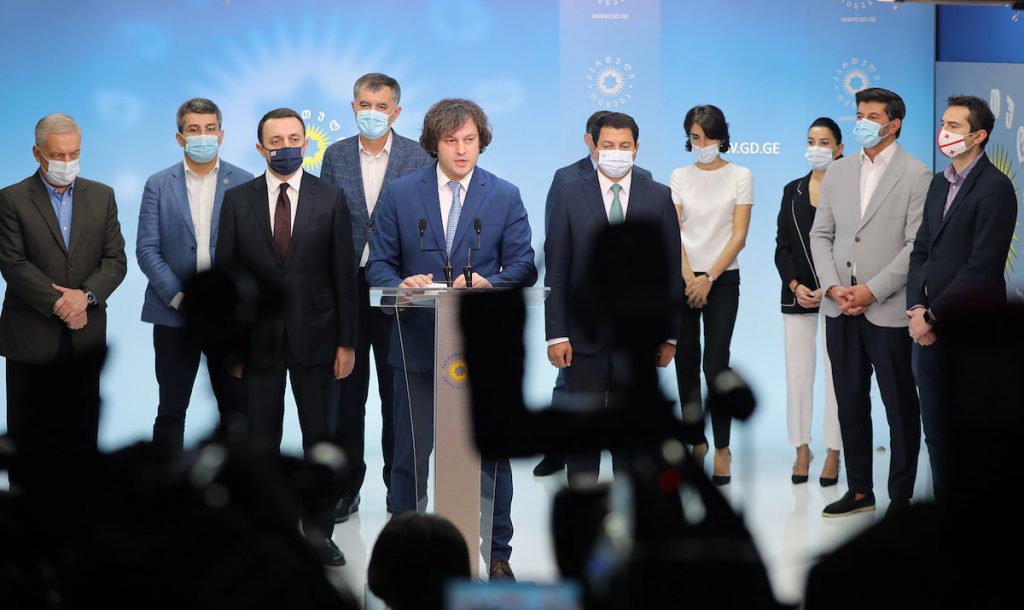Georgia's ruling party opts out of EU-brokered agreement with opposition
Georgian authorities annulled their EU-brokered agreement with the opposition
The ruling Georgian Dream party announced on July 28 that it had officially withdrawn from an agreement with the opposition, signed in April of 2021 with the mediation of the European Union after months of political crisis.
Several opposition leaders immediately left parliament. Experts believe that the annulment of the agreement two months before the important regional elections is a bad sign.
The annulment of the agreement means that the authorities will not fulfill several of its clauses which presupposed concrete steps aimed at bringing the country out of the political crisis that arose after the parliamentary elections of October 2020.

The document, signed in April with the mediation of the President of the European Council Charles Michel after lengthy and dramatic negotiations, offered solutions to several controversial issues, including judicial and electoral reforms.
One of the most important clauses of the agreement concerned the question of whether or not the early parliamentary elections would be held as almost the entire opposition insisted on holding them. The parties eventually agreed that the local government elections scheduled for October 2, 2021 will play the role of a “referendum”: if the ruling party gains less than 43% of the votes, new parliamentary elections will be called.
The chairman of the ruling party Irakli Kobakhidze, reporting at a briefing about the withdrawal from the agreement, said that the clause related to local elections is also no longer valid.
He stated that the Georgian Dream fully complied with the terms of the agreement, and the opposition was to blame for the termination of the agreement, since the document was not signed by the leading opposition force, the United National Movement (the party founded by ex-President of Georgia Mikheil Saakashvili).
Kobakhidze also accused the Western mediators of failing to ensure UNM’s signature of the document:
“The main opposition force did not sign the agreement at all, more than half of the opposition deputies did not, but for some reason, our international partners do not call on the radical opposition to sign the document and work on its implementation”.
At the same time, the leader of the ruling party did not say anything about criticism from international partners against the government for non-compliance with the provisions of the agreement.
Great discontent and indignation of various Western structures were caused by the Georgian government’s failure to comply with the clause of the agreement which stated that the appointment of judges to the Supreme Court would be postponed until the completion of the judicial reform.
In July, parliament approved the appointment of six judges.
The agreement which is referred to as the ‘Charles Michel Document’ in Georgia, was to become one of the important levers to help hold local self-government elections in October in a fair environment.
The Charles Michel document agreement, prepared with unprecedented activity and participation of the international community, underlined Georgia’s commitment to the Euro-Atlantic course.
This decision of the Georgian Dream has already caused another wave of political tension. The leader of the Girchi – Leader of Freedom opposition party Zurab Japaridze has already left the parliament. Lelo party does not exclude the possibility of boycotting the local self-government elections in October.
Experts believe that the cancellation of the document two months before the elections to self-government bodies is a bad sign.
Tornike Sharashenidze, Doctor of International Relations, Professor of GIPA
“It is hardly worth waiting for extraordinary events and sanctions right now, but the frustration on the part of the international community is obvious. Several factors preceded the decision.
The first thing that comes to everyone’s mind is that the authorities are afraid of failure, they are afraid of not gaining that 43% in local elections.
Another is the fact that their decision to appoint judges, received criticism – and got them angry. Apparently, they believe that they do not deserve this criticism, because they made concessions in negotiations with the opposition.
After the parliamentary elections, Georgian Dream, in principle, acted rationally. I took part in the dialogue and in many ways agreed with the West. But when criticism followed because of the appointment of judges, the reaction was exactly the following: why are they only criticizing us, why don’t they criticize the National Movement, they did not sign this document at all, and we were “good guys”.
However, the main reason for the current decision, I think, is different.
The authorities felt confident after opposition TV channels failed to bring large crowds onto the streets.
It is too early to say how it will all end. It seems that their calculation is such that people will not take it to the streets and there will be no sanctions either. But the authorities have greatly worsened the political situation, both internaly and externaly. And we all understand that patience can not last forever”.
Gia Khukhashvili, political analyst
“Research has shown that, despite the mobilization of administrative resources, the authorities are likely to be unable to gain 43% of the vote in local elections in October. And so they took this step – at the cost of their own dignity and political reputation. This is truly inconceivable.
A political crisis awaits us. And in the end, the state will suffer. And how the political opposition will take advantage of this situation is up to them.
In my opinion, all this is absurd, even dictators do not do that. Either they do not sign such documents, or they do it by signing them. This is political reputation.
This does not happen in politics, business, or in any area. This is not only a flagrant violation of political ethics, but also a general lack of human dignity”


















